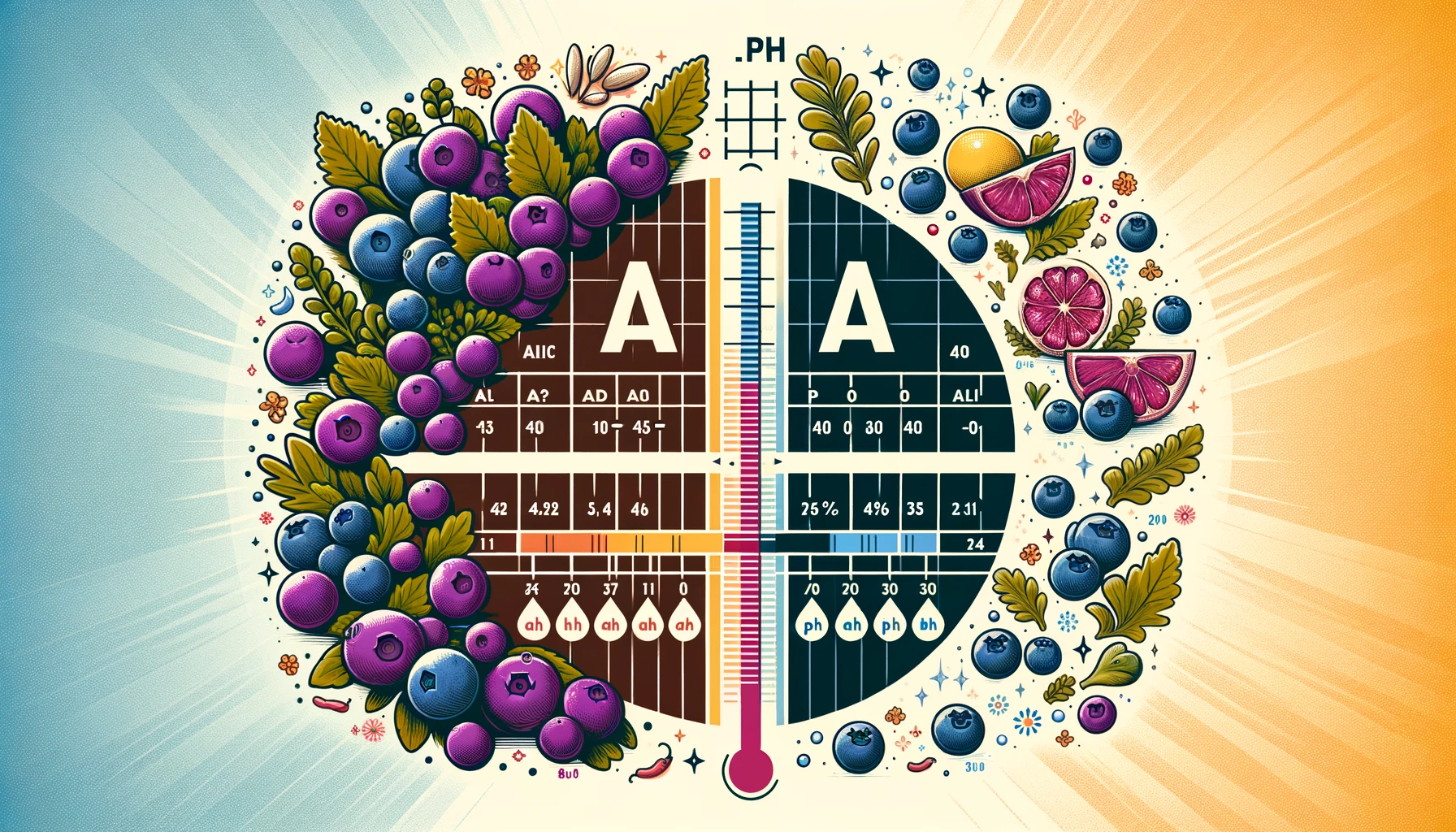
Acai berries, central to the question "Is Acai Acidic or Alkaline?" originate from the rainforests of Central and South America, primarily thriving on the acai palm tree.
These small, dark purple berries are celebrated for their unique flavor, reminiscent of a blend of berries and chocolate, and their impressive nutritional profile.
Acai berries are a superfood with antioxidants, vitamins, and minerals.
This discussion explores whether acai berries are acidic or alkaline, delving into the implications of their pH level on overall health and wellness.
Understanding PH Levels In Food
Understanding pH levels in food is crucial when considering the impact of diet on our body's pH balance. pH measures acidity/alkalinity on a scale from 0-14..pH 7 is neutral, below it is acidic, and above it is alkaline.
Foods are categorized based on their pH levels, influencing their effects on the body. Acidic foods have a pH below 7. They can be beneficial due to their nutrient content. Still, they might also contribute to certain health issues like acid reflux in sensitive individuals.
On the other hand, alkaline foods, like most vegetables and some fruits, have a pH above 7 and are often recommended for their potential health benefits, including improving kidney health and reducing muscle wasting.
The body naturally maintains a tightly controlled blood pH level, typically between 7.35 and 7.45, slightly alkaline. While our diet can affect the pH level of urine, the body's regulatory systems efficiently balance pH levels to maintain homeostasis.
Therefore, consuming acidic or alkaline foods has a limited direct effect on our blood pH but can influence the body's overall health in various ways.
Is Acai Acidic Or Alkaline?
It's important to note some discrepancies in the available information regarding the pH level of acai berries. According to one of the articles, acai berries have a neutral pH of approximately 7.0, suggesting they are neither acidic nor alkaline.
This neutrality indicates that acai berries do not significantly impact the body's acid-base balance, thus neither contributing to acidosis nor alkalosis.
However, another article presents a different perspective, stating that acai is acidic, with a pH around 5.
This acidity is attributed to natural acids like ascorbic acid (vitamin C) and phenolic acids like caffeic and ferulic acids.
These organic acids are responsible for the fruit's acidity and some of its health benefits, like antioxidant properties and protection against inflammation. The contrasting views highlight the complexity of determining the exact pH level of acai berries.
While one source suggests neutrality, the other leans towards acidity, backed by scientific evidence regarding the presence of organic acids. This difference could be due to variations in cultivation, processing, or measurement methods.
Health Benefits Of Acai Berries
With their debated pH level, Acai berries offer a range of health benefits largely attributed to their rich nutritional content.
Antioxidant Properties: Acai berries are high in antioxidants. Compounds in berries reduce stress and inflammation regardless of pH level. Their antioxidant capacity is linked to preventing various diseases, including heart disease and cancer.
Heart Health: The presence of fatty acids, particularly oleic acid, in acai berries supports heart health. Lower LDL raises HDL for better heart health.
Digestive Health: Acai berries are high in fiber, aiding digestion and preventing constipation. This benefit is independent of their pH level.
Skin Health: The vitamins and antioxidants in acai berries benefit skin health. Helps protect the skin from damage.
Energy Boost: Acai berries contain various vitamins, including vitamins A and C, contributing to overall energy levels and vitality.
Immune System Support: Acai berries are rich in Vitamin C, a crucial vitamin for boosting the immune system and protecting the body against infections.
Acai Berries In A Balanced Diet
Incorporating acai berries into a balanced diet can be beneficial and strategic, especially considering their pH level.
Dietary Variety: Acai berries can be a nutritious component of a diverse diet. Like many fruits, their potential acidity adds to the dietary spectrum of pH levels. For individuals monitoring their body's pH, acai can be balanced with more alkaline foods, like green vegetables, to maintain a harmonious dietary pH.
Acid Reflux Consideration: Understanding the pH of foods is crucial for those with acid reflux or sensitive stomachs. While acai is considered neutral or slightly acidic, its impact on acid reflux is minimal compared to more acidic fruits, making it a safer option.
Portion Control: As with any food, moderation is key. Even though acai is nutrient-rich, it's important to consume it reasonably, especially in prepared forms like acai bowls, which may contain added sugars.
Combating Oxidative Stress: Acai's potential antioxidant properties, attributable to its acidic components like ascorbic acid, are beneficial in a balanced diet. Antioxidants are crucial in neutralizing free radicals, contributing to overall health.
Nutrient Absorption: The slight acidity of acai might aid in absorbing certain nutrients, like minerals, which are beneficial in a balanced diet.
Bone Health: For individuals focusing on maintaining an alkaline diet for bone health, acai can be a part of this plan, considering its neutral to slightly acidic nature. Balancing it with more alkaline foods can be advantageous.
Comparison With Other Berries And Fruits
Comparing acai berries to other popular berries and fruits regarding pH level and nutritional content provides a clearer understanding of where acai stands regarding acidity or alkalinity and overall health benefits.
pH Level Comparison
Acai Berries: With a debated pH of around 5.0 to 7.0, acai berries are either slightly acidic or neutral. This positions them uniquely compared to other fruits.
Citrus Fruits (like oranges and lemons): These have a lower pH (more acidic), typically ranging from 2.0 to 4.3.
Berries (such as strawberries, blueberries, and raspberries) generally have a pH of 3.1 to 4.5, making them more acidic than acai.
Melons (like cantaloupe and honeydew): These are less acidic, with a pH closer to neutral, ranging from 6.0 to 7.1.
Nutritional Content Comparison
Acai Berries: High in antioxidants, vitamins C and A, fiber, and heart-healthy fats. They are notable for their anthocyanin content, contributing to their antioxidant properties.
Citrus Fruits: Rich in vitamin C, potassium, and folate. They are lower in calories but higher in citric acid, contributing to their lower pH.
Other Berries: Typically high in vitamins, fiber, and antioxidants. For instance, blueberries are renowned for their high antioxidant content, similar to acai.
Melons: A good source of vitamins A and C, potassium, and water content. They are less acidic and provide different nutritional benefits, such as hydration and lower calorie content.
FAQs
Is Acai Berry Acidic Or Alkaline?
Acai berry's pH level is debated, with some sources stating it's neutral at around 7.0. In contrast, others claim it's slightly acidic with a pH around 5.0.
Can Acai Berries Affect Acid Reflux?
Acai berries are unlikely to cause or worsen acid reflux due to their neutral to slightly acidic nature, making them a safer option than more acidic fruits.
What Are The Key Nutritional Benefits Of Acai Berries?
They are rich in antioxidants, vitamins (especially A and C), fiber, and heart-healthy fats. They support heart health, digestion, immune system, and skin health.
How Do Acai Berries Compare To Other Fruits In Terms Of PH?
Acai berries are potentially less acidic than most berries and citrus fruits but more acidic than melons like cantaloupe and honeydew.
Are There Any Side Effects Of Consuming Acai Berries?
Possible side effects include allergic reactions, weight gain from sugary acai preparations, interference with MRI tests, impact on blood sugar, medication interactions, and stomach issues in case of excessive consumption.
How Can Acai Berries Be Incorporated Into A Balanced Diet?
They can be enjoyed in acai bowls, smoothies, and supplements. They can be balanced with alkaline foods for those monitoring their body's pH.
Conclusion
The debate over whether acai berries are acidic or alkaline remains inconclusive, with conflicting information on their pH level.
While some sources suggest they are neutral at around 7.0, others lean towards a slight acidity, with a pH around 5.0.
Despite pH ambiguity, Acai berries have a rich nutritional profile, including antioxidants, vitamins, fiber, and heart-healthy fats. Acai berries promote heart health, digestion, immunity, and skin health.
